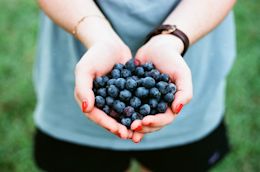
Going vegan: Is it cheap or expensive?
Advocates say that going vegan is better for your health, the environment, and animal welfare — but what is it like for your wallet? Read on to learn more.
9 min read
Many fad diets fall out of fashion as quickly as they came. However, there’s one nutritional “trend” that doesn't show any sign of slowing down: veganism. According to a nutrition study by Veganz, 2,6 million people in Germany are currently vegan — that’s roughly 3,2% of the country’s population. The growing popularity of veganism has even prompted established companies to branch into making vegan-friendly products. But why has this movement increased so dramatically in the last few years? In this article, we’ll explain what veganism is, and how this diet could actually save you money. For thousands of years, different cultures have embraced different forms of nutrition, including vegetarianism and veganism. The word “vegan” was coined by Donald Watson, a staunch supporter of plant-based diets and the founder of the Vegan Society. He deliberately used only the first three letters of the word “vegetarian” to indicate a movement away from all animal-based products. But let’s look at what being “vegan” actually means. In simple terms, vegans consciously avoid all animal products, including meat and fish, milk, eggs, and even honey. Clothing, shoes, and accessories are also carefully chosen to avoid leather, wool, or other materials sourced from animals. Vegans also tend to opt for cruelty-free makeup and skincare products that haven’t been tested on animals and don’t contain animal-derived ingredients. There are plenty of compelling reasons to go vegan. For many people, veganism is about wanting to stop animals from suffering. But meat and dairy consumption also have dire environmental impacts. As much as 37% of global greenhouse gas emissions can be traced back to our food system, making the consumption of animal products one of the key drivers of climate change. A third major reason is personal health, as consuming large amounts of meat — particularly when it’s heavily processed — can have negative impacts on your health and wellbeing. While vegans avoid all animal products, vegetarians aren’t quite as strict. A vegetarian doesn’t eat animals, meaning they avoid fish and meat. However, dairy products, eggs, and honey are included in a vegetarian diet. In contrast to vegetarians and vegans, pescetarians allow themselves one further exception to a fully animal-free diet. While they don’t eat red meat or poultry, they do consume fish and seafood — in fact, pesce is the Italian word for fish. Pescetarians also generally consume dairy products and eggs, too. In general, a vegan diet is pretty straightforward: You just need to remove all animal products from your meal plan. And although it may seem like there aren’t many options left, vegans actually have a large array of plant-based foods to choose from, including vegetables, fruit, and grains. Before you decide to go vegan, you should first check out a vegan food pyramid and learn about the vitamins and minerals that a vegan diet can’t provide you with naturally — and then find supplements that will replace these in your diet. Otherwise, you can end up deficient in essential nutrients, which can cause fatigue, mood changes, brittle nails, hair loss, and much more. Vegans primarily eat plant-based foods like fruit, vegetables, and whole grains. But their meals often include industrially produced foods such as bread, pasta, and vegan yogurt, too — as well as tofu and meat substitutes. The vegan food pyramid is a vital resource for ensuring that you get sufficient nutrients when following this diet. Here’s what it looks like: Whether going vegan is healthy or not is hotly debated. Depending on the study, you’ll get different results on the pros and cons of veganism. The important thing is not to go vegan without being fully informed. If you’re not careful, any diet or nutrition plan can lead to malnutrition, especially when your diet is low in important vitamins and minerals like vitamin B12, iodine, iron, calcium, vitamin D3, and omega-3 fats. However, these can easily be incorporated to any balanced diet, or added through supplements. Following a vegan diet is much more complex than simply avoiding meat or dairy products. But how much will going vegan affect your wallet? There’s a widespread perception that going vegan is as expensive or even more costly than eating meat. And while this can be true, it’s likely only the case if you eat a lot of pricy convenience foods, like vegan schnitzel and other meat substitutes. If you really dive into vegan nutrition and check out individual foods — including their nutrients, fat, protein, and carbohydrate content — you can eat much more cheaply than you would as an omnivore. A study led by nutritionist Dr. Markus Keller for the non-profit research institute for plant-based nutrition (IFPE) compared the prices of 20 popular German dishes. The results were divided into meat- or fish-based foods, as well as sugary foods, and showed the difference between omnivores and vegan diets. The results? Popular vegan dishes were much cheaper to make than animal-based ones. In the end, whether life is cheaper as a vegan depends a lot on what you eat and how well you’re able to manage your diet. For example, you don’t just get protein from meat substitutes, but also from different protein-rich vegetables and legumes, as well as protein powder that can be easily sprinkled on vegan yogurt or porridge. It’s not really true that vegan products are more expensive than animal-based ones across the board. In fact, avoiding meat, fish, eggs, and dairy products can have a positive impact on your wallet. That’s especially the case if you generally spring for high-quality animal products, which don’t come cheap. Staples like pasta, rice, potatoes, bread, vegetables, and fruit are all vegan and generally inexpensive. Of course, prices may be impacted by inflation or deflation — but relatively speaking, many plant-based foods are still cheaper than animal products. To be fair, meat and dairy substitutes can be expensive compared to the equivalent animal products. However, this is partly because many of the substitute products are still in development — and small companies need more financing to be able to make these products at scale. Animal products have a leg up on the vegan competition, too: They’re subsidized by the government. Meat and milk products are only taxed at 7% VAT, but meat substitutes have 19% added in tax. A vegan diet can be healthy and cheap, as long as you pay attention to a few key factors. Here are some tips to get started:Each January, the number of vegans rises. The “Veganuary” initiative was created to encourage even more people to go vegan, or to simply reduce their consumption of meat and animal products. A mashup of the words “vegan” and “January,” the idea of Veganuary is to commit to eating vegan for a whole month as a way to improve your health, minimize your environmental impact, and reduce animal suffering. For several years now, businesses and restaurants alike have been taking advantage of Veganuary to expand their plant-based offers. If you’re thinking of going vegan, January might be the perfect time to try it out.
What is a vegan diet?
What’s the difference between vegans and vegetarians?
What’s the difference between vegans and pescatarians?
What you should know before going vegan
What do vegans eat?
- Beverages: The bottom — and largest — tier is drinks like water, coffee, and tea.
- Fruit and vegetables: Next up, there’s vegetables and fruits in a 70/30 ratio, respectively. Fruits contain fruit sugar, which means they should always be eaten in moderation.
- Whole grains, rice, potatoes, etc: The third tier consists of carbohydrates. These foods provide you with energy for your day-to-day and keep you feeling full.
- Legumes, protein sources, milk alternatives, nuts and seeds: The fourth tier includes all your protein sources, which help you build muscle and transmit healthy fats, such as the omega-6 fatty acids contained in nuts. Because proteins like meat and fish aren’t included in a vegan diet, it’s especially important for vegans to ensure that they’re getting enough protein. The official recommendation is at least 8.8 grams of protein per kilogram of body weight, while athletes or people who are especially active should consume 1.2 to 2.0 grams per kilogram of body weight.
- Oil, fat, and salt: The second-to-last tier should be used sparingly — and preference goes to high-quality products, especially when it comes to fats and oils.
- Sweets, snacks, and alcohol: At the top is the treat tier. These indulgences should be kept to a minimum, as they tend to contain a large amount of sugar and salt.
How healthy is veganism?
Is going vegan cheap?
Why is vegan food so expensive?
Budget tips for vegans
- Learn the basics: Before you go vegan, it’s important to learn which nutrients and minerals you absolutely need. This includes carbohydrates and protein, but also micronutrients such as iron, zinc, and selenium. This will make it easier to create a balanced nutrition plan that incorporates all your needs — while keeping your costs low.
- Cook at home: Starting out with pre-made products can make things easier in the beginning, but this is much more expensive than buying ingredients and cooking meals yourself. If you don’t want to spend hours every day in front of the stove — and also want to save on your monthly electric bill — it helps to cook larger portions of rice or pasta and store them in the fridge. Even certain vegetable dishes like curries can be prepared in bulk and eaten for a few days. Another bonus: When you cook for yourself, you always know what you’re eating and can avoid sneaky ingredients like flavor enhancers or too much salt and sugar.
- Buy local and hunt for bargains: Avocado toast isn’t just super tasty, it’s also vegan! Unfortunately, though, avocados aren’t cheap, nor are they the most environmentally friendly food. It’s better to pay attention to which fruits and vegetables are in season locally, as these tend to be cheaper and have a lower carbon footprint. It’s also good to look out for special offers at the supermarket, like on fruits, vegetables, and meat substitutes. You can even store them in the freezer — so you can save money and have a stash of food on-hand for those days when you suddenly run out of groceries!
- Plan out your week: Another way to save on costs is to plan what you’ll eat for the entire week. Bargains at the grocery store can help you with your meal planning. Planning also helps you eliminate food waste by making sure that every ingredient is accounted for. And any leftover food can be frozen and eaten another day!
What is Veganuary?
Find similar stories
BY N26Love your bank
Related Post
These might also interest youLIFESTYLECould AI help you manage your money?86% of people are open to using AI for financial planning, but is it safe? Learn how AI is already transforming money management, and discover the pros and cons.
4 min read
LIFESTYLEUnderstanding tariffsFrom higher grocery bills, pricier electronics, and stock market swings, tariffs can impact your wallet and your investments.
5 min read
LIFESTYLEDe-hyping the no-spend challengeThis extreme challenge promises to transform your finances, but is it really the game-changer it claims to be?
4 min read


